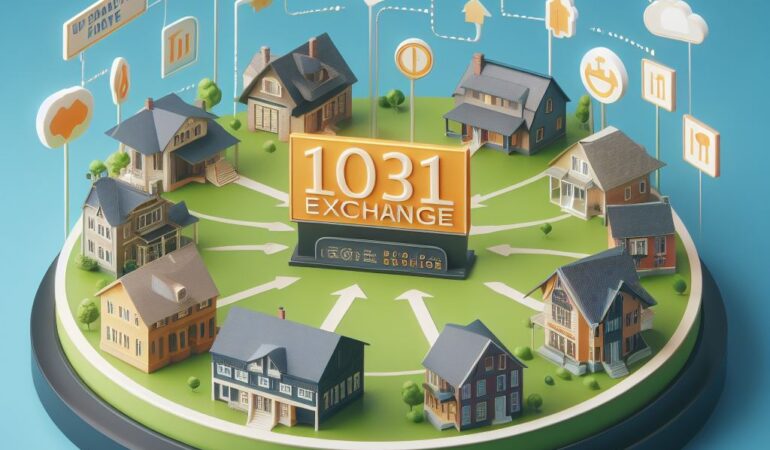When it comes to a 1031 exchange, you must find suitable replacement property. This is crucial for a multitude of reasons. By doing so, you can defer taxes, meet exchange requirements, and avoid capital gains taxes.
Not only that, but finding the right replacement property also helps preserve your investment portfolio and maximize your return on investment.
In this article, we will delve into why finding suitable replacement property is of utmost importance for a successful 1031 exchange.
Key Takeaways
- 1031 exchange allows for tax deferral on capital gains taxes and depreciation recapture taxes through reinvesting in like-kind property.
- Replacement property must be of like-kind to the property sold, meaning it should have a similar nature or character.
- Suitable replacement property is crucial to avoid capital gains taxes and preserve investment capital.
- Finding suitable replacement property is important for maximizing return on investment by focusing on properties in high-demand locations with strong economic fundamentals and favorable rental markets.
Tax Deferral Benefits
When considering a 1031 exchange, it’s crucial for you to understand the significant tax deferral benefits that come with finding suitable replacement property.
The main advantage of a 1031 exchange is the ability to defer capital gains taxes on the sale of an investment property. By reinvesting the proceeds into another like-kind property, you can avoid paying taxes on the gain realized from the sale. This deferral allows you to keep more of your money working for you and provides a powerful tool for building wealth through real estate investments.
In addition to deferring capital gains taxes, a 1031 exchange also allows you to defer depreciation recapture taxes. When you sell a property, you may have to recapture a portion of the depreciation deductions you claimed over the years. However, by participating in a 1031 exchange and acquiring suitable replacement property, you can defer paying these taxes. This provides you with more funds to invest in a new property and continue building your real estate portfolio.
It is important to note that while a 1031 exchange allows for tax deferral, it doesn’t provide a complete tax exemption. When you eventually sell the replacement property, you’ll need to pay the deferred taxes. However, by continuously reinvesting in new properties through 1031 exchanges, you can potentially defer taxes indefinitely and continue to grow your investments.
Meeting 1031 Exchange Requirements
To meet the requirements of a 1031 exchange, you must ensure that the replacement property you acquire is of like-kind to the property you sold. Like-kind refers to the nature or character of the property, rather than its grade or quality. This means that you can exchange a wide range of investment or business properties, as long as they are of the same type. For example, you can exchange a residential rental property for a commercial property, or a vacant land for an office building. To give you a clearer picture, here is a table illustrating some examples of like-kind exchanges:
| Property Sold | Property Acquired |
|---|---|
| Residential rental property | Commercial property |
| Office building | Retail shopping center |
| Vacant land | Industrial warehouse |
These are just a few examples, but the possibilities for like-kind exchanges are vast. It is important to note that personal-use properties, such as your primary residence, do not qualify for a 1031 exchange. Now that you understand the requirements for a successful exchange, let’s move on to the next section, where we will discuss how a 1031 exchange can help you avoid capital gains taxes.
Avoiding Capital Gains Taxes
To avoid paying capital gains taxes, it’s crucial to find suitable replacement property for a 1031 exchange. When you sell a property and use the proceeds to invest in a like-kind property, you can defer capital gains taxes. This allows you to preserve your investment capital and potentially increase your overall wealth. By utilizing a 1031 exchange, you can defer capital gains taxes and keep more money working for you.
The key to avoiding capital gains taxes is to ensure that the replacement property meets the requirements of a like-kind exchange. The property must be of equal or greater value and the exchange must be completed within a specific timeframe. Additionally, the replacement property must be used for business or investment purposes. By finding suitable replacement property, you can take advantage of the tax benefits provided by a 1031 exchange and avoid paying capital gains taxes on your real estate transactions.
Transitioning into the next section about the preservation of your investment portfolio, it’s important to consider how a 1031 exchange can help you accomplish this goal.
Preservation of Investment Portfolio
Preserving your investment portfolio is essential when engaging in a 1031 exchange by finding suitable replacement property. By carefully selecting properties that align with your investment goals and strategy, you can ensure the continued growth and diversification of your portfolio.
One way to preserve your investment portfolio is by considering the potential risks and returns of different types of replacement properties. This can be done by conducting a thorough analysis that takes into account factors such as location, market conditions, tenant quality, and lease terms. By diversifying your portfolio with properties in different geographical areas or sectors, you can mitigate the risks associated with any single investment.
To help you visualize the importance of preserving your investment portfolio through a 1031 exchange, consider the following table:
| Property Type | Location | Market Conditions | Tenant Quality | Lease Terms |
|---|---|---|---|---|
| Office Building | Downtown | Strong | High | Long-term |
| Retail Center | Suburban | Stable | Medium | Short-term |
| Industrial Park | Outskirts | Growing | Low | Medium-term |
| Residential | Urban | Declining | High | Long-term |
| Mixed-use | City Center | Volatile | Medium | Short-term |
Maximizing Return on Investment
When considering a 1031 exchange, it’s important to focus on maximizing your return on investment. This can be achieved by carefully selecting suitable replacement properties that have the potential for long-term growth and profitability.
One way to maximize your return on investment is to identify properties in high-demand locations with strong economic fundamentals. These areas typically experience population growth, job creation, and increased property values, all of which can contribute to higher returns.
Additionally, investing in properties with favorable rental markets and stable rental income streams can help you maximize your return on investment.
Another strategy to consider is investing in properties that offer value-add opportunities. These properties may require some improvements or renovations, but the potential for increased rental income or property appreciation can significantly enhance your return on investment.
It’s also crucial to carefully analyze the financial aspects of potential replacement properties, such as cash flow projections, operating expenses, and projected appreciation. By conducting thorough due diligence and considering these factors, you can make informed decisions that will help you maximize your return on investment through a 1031 exchange.
Frequently Asked Questions
What Is a 1031 Exchange and How Does It Work?
A 1031 exchange is a tax-deferral strategy that allows you to exchange one investment property for another without paying capital gains tax. It’s important to find suitable replacement property to continue deferring taxes and grow your investment portfolio.
Are There Any Time Limits for Identifying and Closing on a Replacement Property in a 1031 Exchange?
You must identify a replacement property within 45 days and close on it within 180 days to complete a 1031 exchange. These time limits ensure timely completion and compliance with IRS regulations.
Can I Use a 1031 Exchange to Defer Taxes on the Sale of a Personal Residence?
No, you cannot use a 1031 exchange to defer taxes on the sale of a personal residence. This type of exchange is specifically for investment or business properties.
What Happens if I Am Unable to Find a Suitable Replacement Property Within the Specified Time Frame?
If you fail to find a suitable replacement property within the specified time frame, you may have to pay taxes on the capital gains from the sale. It’s crucial to diligently search for eligible properties to avoid this potential financial burden.
Are There Any Restrictions on the Types of Properties That Can Be Used as Replacement Properties in a 1031 Exchange?
There are several restrictions on the types of properties that can be used as replacement properties in a 1031 exchange. It is important to understand these limitations before proceeding with your exchange.




